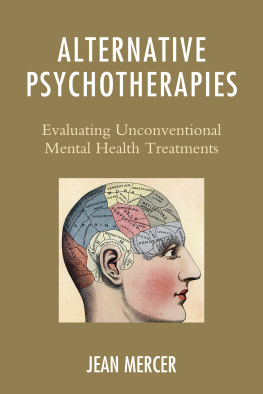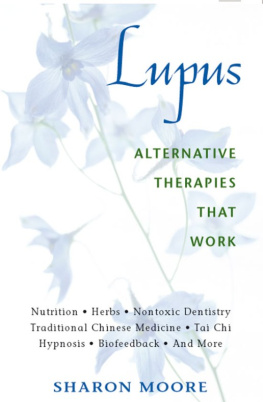Alternative Psychotherapies
Alternative Psychotherapies
Evaluating Unconventional
Mental Health Treatments
Jean Mercer
ROWMAN & LITTLEFIELD
Lanham Boulder New York London
Published by Rowman & Littlefield
A wholly owned subsidiary of The Rowman & Littlefield Publishing Group, Inc.
4501 Forbes Boulevard, Suite 200, Lanham, Maryland 20706
www.rowman.com
16 Carlisle Street, London W1D 3BT, United Kingdom
Copyright 2014 by Rowman & Littlefield
All rights reserved. No part of this book may be reproduced in any form or by any electronic or mechanical means, including information storage and retrieval systems, without written permission from the publisher, except by a reviewer who may quote passages in a review.
British Library Cataloguing in Publication Information Available
Library of Congress Cataloging-in-Publication Data
Mercer, Jean, author.
Alternative psychotherapies : evaluating unconventional mental health treatments / Jean Mercer.
p. ; cm.
Includes bibliographical references and index.
ISBN 978-1-4422-3491-8 (cloth : alk. paper) -- ISBN 978-1-4422-3492-5 (electronic)
I. Title.
[DNLM: 1. Psychotherapy--methods. 2. Complementary Therapies. 3. Mental Disorders--therapy. WM 420]
RC480.5
616.89'14--dc23
2014020912
 TM The paper used in this publication meets the minimum requirements of American National Standard for Information Sciences Permanence of Paper for Printed Library Materials, ANSI/NISO Z39.48-1992.
TM The paper used in this publication meets the minimum requirements of American National Standard for Information Sciences Permanence of Paper for Printed Library Materials, ANSI/NISO Z39.48-1992.
Printed in the United States of America
For Jack and Teagan
Acknowledgments
My sincere thanks to editor Amy King, the only one of many who had seen this books proposal to give me a push in the direction that was really needed. Also, to the helpful librarians of Richard Stockton College, to Dr. Katerina Thorova and Mrs. Alena Bilkova of APLA for their invitation to speak on alternative psychotherapies for autism in the Czech Republic, and to my husband, Mike Wick, who never coaxes me to quit working and go sailing. Grateful acknowledgment, too, to Craig Whittaker, Member of Parliament for Calder Valley, who spent some hours with Dr. Matt Woolgar and me in discussion of the use of holding therapy in Britain.
Chapter 1
Introducing the Issue
of Alternative Psychotherapies
Its been a long time since the Peanuts character Lucy offered unspecified psychiatric help for five cents, but in popular discussion psychotherapy remains generic. I told him, he needs to get help. I dont care where she goes, she just needs some kind of therapy. Any therapy is better than no therapy, thats what I figure. Hes going to some kind of psychiatrist or psychologist, or maybe its a social worker, but a therapist anyway. Theyre taking their kids for some new kind of therapy.
What about the views of mental health professionals? Is any therapy better than no therapy? Practitioners seem to take contradictory views of this issue.
On one hand, there is distinct reluctance to say that one treatment is better than another specified treatment, and public criticism of another practitioners methods is discouraged by professional ethics guidelines (Ethical principles of psychologists... 2010). In one group of mental health professionals asked to consider concerns about a form of psychotherapy, the following arguments were used to oppose public criticism: If you talk about negative things, it only gives longer life to an undesirable kind of treatment. Its important only to mention positive aspects if you talk about a psychotherapy or a practitioner. If you must talk about anything negative, you should stress that yours is only a different viewpoint.
Over and above this concern about negative criticisms, however, we can easily see that mental health professionals do not consider all therapies exactly alike. Psychotherapies are commonly categorized into a small number of groups. There are conventional or established psychotherapies, taught in accredited institutions, plausible in terms of their congruence with accepted information about human beings, and often supported by systematic research evidence. There are emerging therapies, usually congruent with accepted information, but not yet fully developed or subjected to outcome studies. Finally, there is a group of therapies that may be called controversial, unorthodox, fringe, unconventional, or alternative; these are implausible in at least some of their foundational ideas, lacking in acceptable research support (as defined by psychologists, psychiatrists, and clinical social workers), and may also have unusual potential for harm to clients or families. The last of these will be the topic of this book.
All therapies that have the power to do good also have the possibility of doing harm, directly, indirectly, or as a side effect. Alternative psychotherapies, however, are by definition the most likely to do harm without this effect being balanced by good. That they can do serious harm was seen two decades ago in the United States as Recovered Memory Therapies convinced the public and many professionals that there had been an epidemic of Satanic Ritual Abuse. The posited epidemic involved systematic child molestation, baby burning, and human and animal sacrificeevents that unfortunately do occasionally happen, but which never occurred in any epidemic fashion. Resources were wasted and families devastated by the accusations that were made.
As Richard Noll (2013) has pointed out, enough time has passed since the moral panic about Satanic Ritual Abuse so that many have forgotten how mental health professionals were drawn into the belief system fostered by the alternative psychotherapy. Students beginning their professional training today may never have heard of these events, and therefore they may be vulnerable to participation in a similar panic created in association with an alternative psychotherapy. Its out of concern with these issues that this book on alternative therapies is written.
Alternative Psychotherapies: Developing Views
Alternative psychotherapiestreatments that are implausible, unsupported or weakly supported by evidence, and potentially harmfulbecame a topic in themselves when Singer and Lalich (1996) wrote of them as crazy therapies. These crazy treatments are the psychotherapeutic parallel to complementary and alternative medicine (CAM). Singer and Lalich (1996) described more than a dozen unorthodox psychological treatments, warned readers of their ineffectiveness and potential dangers, and suggested ways for therapeutic clients to assess the appropriateness of therapists and therapies. They associated many treatments with New Age beliefs and made it clear that conventional psychotherapies were based on entirely different views of mental and emotional life. Their book CrazyTherapies considered a wide variety of craziness, including the attribution of emotional distress to alien abductions or to Satanic Ritual Abuse, and treatments in which the client was diapered and bottle-fed by the therapist.
Singer and Lalich were interested in the cult-like characteristics of some of the therapies they examined, and in the reasons that motivated clients to pursue these treatments. They were especially concerned that potential clients might not recognize the crazy nature of the treatments they were offered, and that some therapists might be able to manipulate their clients to stay in treatment even when there were serious negative effects on their moods and lives. In CrazyTherapies, Singer and Lalich offered detailed anecdotes and case histories that could be expected to engage the attention of readers and convince them that conventional therapies were a better choice than pseudoscientific methods.
Next page







 TM The paper used in this publication meets the minimum requirements of American National Standard for Information Sciences Permanence of Paper for Printed Library Materials, ANSI/NISO Z39.48-1992.
TM The paper used in this publication meets the minimum requirements of American National Standard for Information Sciences Permanence of Paper for Printed Library Materials, ANSI/NISO Z39.48-1992.